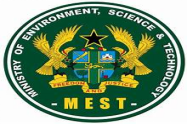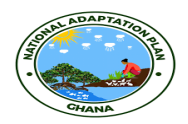The Ghana Climate Vulnerability Hub is founded on strategic partnerships that unite government leadership, international expertise, and multi-stakeholder collaboration to build resilience to climate change through accessible climate information.
Lead Implementation Partners
Environmental Protection Agency (EPA)
As the primary implementing institution, EPA hosts the National Adaptation Plan (NAP) Project Management Unit and provides institutional leadership, technical oversight, and ensures alignment with national environmental policies.
Role: Coordinates project implementation and maintains the platform's long-term sustainability.

Visit EPA Website
Ministry of Environment, Science, Technology and Innovation (MESTI)
MESTI provides high-level policy direction and government oversight, ensuring the platform aligns with Ghana's environmental and climate policy framework.
Role: Ensures contribution to Ghana's international climate commitments under the Paris Agreement.

Visit MESTI Website
International Development Partners
United Nations Environment Programme (UNEP)
UNEP serves as the official delivery partner, providing technical expertise, international best practices, and quality assurance throughout the development of the portal. UNEP ensures the platform meets international standards for climate information systems.
Role: Ensures the platform meets international standards for climate information systems.

Visit UNEP Website
Green Climate Fund (GCF)
GCF provides essential financial resources through its Readiness and Preparatory Support Programme, enabling Ghana to build institutional capacity and develop technical infrastructure for effective climate adaptation planning.
Role: Financial support and capacity building for climate adaptation infrastructure.

Visit GCF Website
Government Data Partners
Key government institutions provide critical datasets through formal Memoranda of Understanding (MOUs):
Ministry of Food and Agriculture
Data Provided: Agricultural production data and food security indicators.
Ministry of Water Resources and Sanitation
Data Provided: Water resource data and security assessments.
Ghana Health Service
Data Provided: Health vulnerability data and climate-health impact assessments.
Ministry of Energy
Data Provided: Energy consumption patterns and biomass energy data.
Energy Commission
Data Provided: Energy sector regulation and renewable energy data.
Ministry of Local Government, Decentralization and Rural Development
Data Provided: Local governance and rural development indicators.
Ministry of Gender, Children and Social Protection
Data Provided: Gender-responsive data and social protection indicators.
Ministry of Transport
Data Provided: Transportation infrastructure and mobility data.
National Disaster Management Organization (NADMO)
Data Provided: Disaster risk and emergency response data.
Ghana Statistical Service
Data Provided: Demographic data and socioeconomic datasets.
Ghana Meteorological Agency
Data Provided: Climate data and meteorological projections.
Sub-National Partners
Metropolitan, Municipal and District Assemblies (MMDAs)
Three pilot district assemblies serve as crucial sub-national implementation partners, providing local-level data, community engagement, and testing district-level functionalities.
Pilot Districts:
- Tamale Metropolitan Assembly
- Sekondi-Takoradi Metropolitan Assembly
- Bekwai Municipal Assembly
Role: Through formal MOUs, these partners ensure the portal serves local adaptation planning while contributing to national climate objectives.
National Adaptation Plan (NAP) Project
Learn more about Ghana's National Adaptation Plan framework and initiatives.

Visit NAP Ghana Website
